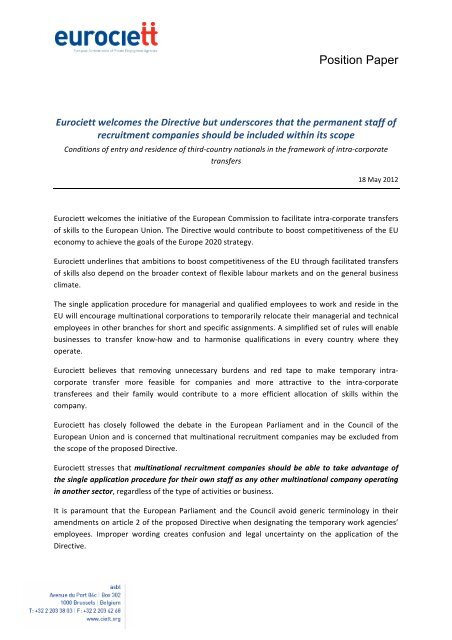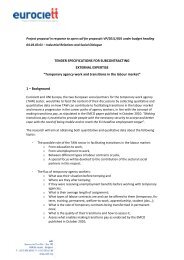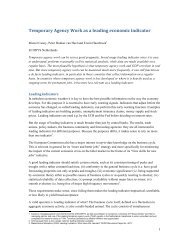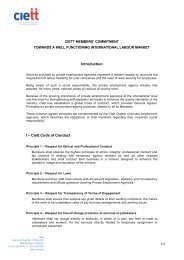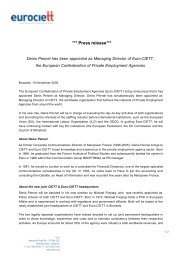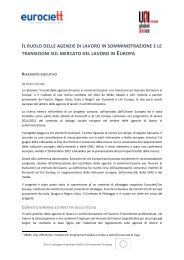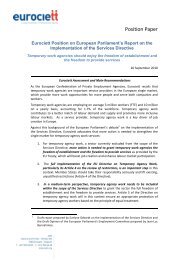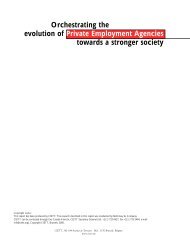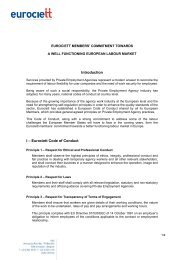Position Paper - Eurociett
Position Paper - Eurociett
Position Paper - Eurociett
You also want an ePaper? Increase the reach of your titles
YUMPU automatically turns print PDFs into web optimized ePapers that Google loves.
<strong>Position</strong> <strong>Paper</strong><br />
<strong>Eurociett</strong> welcomes the Directive but underscores that the permanent staff of <br />
recruitment companies should be included within its scope <br />
Conditions of entry and residence of third-‐country nationals in the framework of intra-‐corporate <br />
transfers <br />
18 May 2012 <br />
<strong>Eurociett</strong> welcomes the initiative of the European Commission to facilitate intra-‐corporate transfers <br />
of skills to the European Union. The Directive would contribute to boost competitiveness of the EU <br />
economy to achieve the goals of the Europe 2020 strategy. <br />
<strong>Eurociett</strong> underlines that ambitions to boost competitiveness of the EU through facilitated transfers <br />
of skills also depend on the broader context of flexible labour markets and on the general business <br />
climate. <br />
The single application procedure for managerial and qualified employees to work and reside in the <br />
EU will encourage multinational corporations to temporarily relocate their managerial and technical <br />
employees in other branches for short and specific assignments. A simplified set of rules will enable <br />
businesses to transfer know-‐how and to harmonise qualifications in every country where they <br />
operate. <br />
<strong>Eurociett</strong> believes that removing unnecessary burdens and red tape to make temporary intra-corporate<br />
transfer more feasible for companies and more attractive to the intra-‐corporate <br />
transferees and their family would contribute to a more efficient allocation of skills within the <br />
company. <br />
<strong>Eurociett</strong> has closely followed the debate in the European Parliament and in the Council of the <br />
European Union and is concerned that multinational recruitment companies may be excluded from <br />
the scope of the proposed Directive. <br />
<strong>Eurociett</strong> stresses that multinational recruitment companies should be able to take advantage of <br />
the single application procedure for their own staff as any other multinational company operating <br />
in another sector, regardless of the type of activities or business. <br />
It is paramount that the European Parliament and the Council avoid generic terminology in their <br />
amendments on article 2 of the proposed Directive when designating the temporary work agencies’ <br />
employees. Improper wording creates confusion and legal uncertainty on the application of the <br />
Directive.
Indeed, temporary work agencies have two types of employees: their permanent staff, employed as <br />
HR consultants, branch managers, branch office assistants; and the temporary agency workers, <br />
employed by the temporary work agencies but assigned to user companies. <br />
Notably, <strong>Eurociett</strong> warns that proposing language on article 2.2, listing the cases excluded from the <br />
scope of the proposed Directive, such as “third-‐country nationals employed by a temporary work <br />
agency” would exclude all the permanent staff of the recruitment companies altogether from the <br />
simplified procedures put in place by the proposed Directive 1 . <br />
<strong>Eurociett</strong> invites not to confuse employees of the recruitment companies under a direct <br />
employment relationship, who should be able to be included in the scope of the Directive, with <br />
those recruited under a triangular relationship (temporary agency workers). <br />
<strong>Eurociett</strong> therefore urges the European Parliament and the Council of the European Union not to <br />
discriminate recruitment companies from taking advantage of the single application procedure for <br />
their directly hired staff. <br />
With a view to the functioning of the labour market, <strong>Eurociett</strong> recalls that the role of multinational <br />
staffing companies is critical to organise labour migration. <br />
There are 128,000 private employment agencies worldwide and with a network of 176,000 branches <br />
and almost one million internal staff. Such network provides multinational staffing companies with <br />
extensive knowledge of the needs in the labour markets and puts them in the ideal position to <br />
organise labour migration where labour demands cannot be locally satisfied. <br />
It is important for multinational staffing companies to be able to take advantage of the single <br />
application procedure to assign third-‐country nationals under the triangular relationship to cater to <br />
the needs of user clients in the EU labour market. <br />
This is particularly necessary with high-‐skilled workers holding managerial positions that are in <br />
demand within the EU, but often not available within the company for an intra-‐corporate exchange. <br />
It is in this case that multinational staffing companies could use the single application procedure to <br />
assign their employees in the triangular relationship to quickly satisfy the requests of user <br />
companies. <br />
A swift response to the needs of European businesses enables them to maintain their <br />
competitiveness and foster economic growth. In addition, including temporary agency workers in <br />
the scope of the proposed Directive would further contribute exchange of skills and knowledge <br />
between the EU and third countries. <br />
1 Cf. the document from the Presidency of the Council of the European Union, Working Party on Integration, <br />
Migration and Expulsion, 17247/1/10 of 8 December 2010. <br />
-‐2/3-‐
For this reason, <strong>Eurociett</strong> recommends to go back to the wording of article 2 of the Directive as <br />
proposed by the European Commission, which excludes from the scope only cases that are already <br />
disciplined by other legal instruments, either by other Directives or by international agreements <br />
between the Union and third countries 2 . <br />
For more information, contact: <br />
Sandro Pettineo <br />
Policy Advisor <br />
sandro.pettineo@ciett.org <br />
About <strong>Eurociett</strong>: <br />
As the European confederation of private employment agencies, <strong>Eurociett</strong> is the authoritative voice <br />
representing the common interests of the agency work industry in Europe. <strong>Eurociett</strong> gathers 31 national <br />
federations from EU and EFTA countries, and 6 of the largest international staffing companies as corporate <br />
members. Its main objective is to seek greater recognition for the positive role private employment <br />
agencies play in the labour market. <br />
More info at www.eurociett.eu <br />
2 Directive 2005/71/EC, Directive 96/71/EC, and article 56 of the Treaty on the Functioning of the European <br />
Union; COM(2010) 378 final. <br />
-‐3/3-‐


